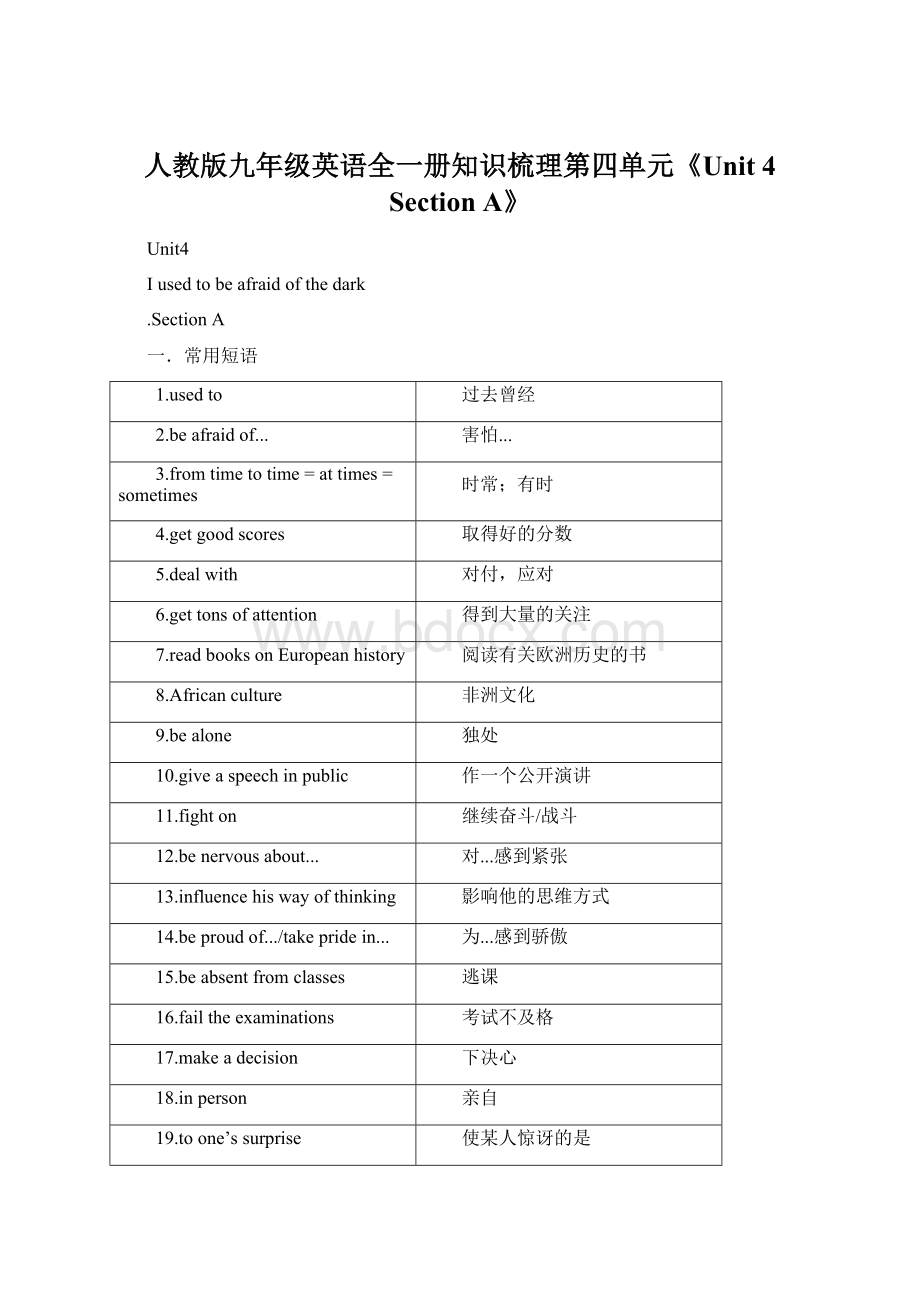人教版九年级英语全一册知识梳理第四单元《Unit 4 Section A》.docx
《人教版九年级英语全一册知识梳理第四单元《Unit 4 Section A》.docx》由会员分享,可在线阅读,更多相关《人教版九年级英语全一册知识梳理第四单元《Unit 4 Section A》.docx(10页珍藏版)》请在冰豆网上搜索。

人教版九年级英语全一册知识梳理第四单元《Unit4SectionA》
Unit4
Iusedtobeafraidofthedark
.SectionA
一.常用短语
1.usedto
过去曾经
2.beafraidof...
害怕...
3.fromtimetotime=attimes=sometimes
时常;有时
4.getgoodscores
取得好的分数
5.dealwith
对付,应对
6.gettonsofattention
得到大量的关注
7.readbooksonEuropeanhistory
阅读有关欧洲历史的书
8.Africanculture
非洲文化
9.bealone
独处
10.giveaspeechinpublic
作一个公开演讲
11.fighton
继续奋斗/战斗
12.benervousabout...
对...感到紧张
13.influencehiswayofthinking
影响他的思维方式
14.beproudof.../takepridein...
为...感到骄傲
15.beabsentfromclasses
逃课
16.failtheexaminations
考试不及格
17.makeadecision
下决心
18.inperson
亲自
19.toone’ssurprise
使某人惊讶的是
20.feelgoodaboutoneself
对自己充满信心
21.ageneralself-introduction
一个简要的自我介绍
22.inthelastfewyears
在最近几年
23.remainsilent
保持沉默
24.haveagreatinfluenceonsb.
对某人有很大的影响
25.advisesb.todosth.
建议某人做某事
26.atleast
至少
27.anumberof...
许多...
28.not...anymore
不再...
二.考点精练
▶考点一反义疑问句的用法
1.Mario,youusedtobeshort,didn’tyou?
马里奥,你过去很矮,对吗?
(P251a)
这是一个反意疑问句。
此类反意疑问句的结构为:
肯定的陈述句+否定的附加问句→“前肯后否”
否定的陈述句+肯定的附加问句→“前否后肯”
注意:
前后两部分的人称数和时态等必须要保持一致!
➩Shedoesn’tlikeshopping,doesshe?
她不喜欢购物,是吗?
➩Yourfatherwenttothepark,didn'the?
你爸爸去公园了,是吗?
➩Youdon’tlikeclassicalmusic,doyou?
你不喜欢古典音乐,对吗?
【拓展】
①对反意疑问句的回答,不管问题的提法如何,如果事实是肯定的用yes,事实是否定的用no。
②陈述句部分含有few(几乎没有)、little(几乎没有)、seldom(几乎不)、hardly(几乎不)、never(从不)或nothing(没有任何东西)等否定词,附加问句要用肯定形式。
➩HehasneverbeentoLondon,hashe?
他从来没有去过伦敦,是吗?
【易错提醒】
无论何种形式的反意疑问句,依据事实来回答即可。
如果事实是肯定的,要用yes;如果事实是否定的,要用no。
只是要注意“前否后背”的答语中,yes和no与汉语意思正好相反。
➩Hedidn'tpasstheexam,didhe?
他没有通过考试。
——Yes,hedid.不,他通过了。
(事实是肯定的)
——No,hedidn’t.是的,他没有通过。
(事实是否定的)
【小试牛刀】
1.--Stevenhadnothingforbreakfastthismorning,______________?
--No.Becausehehadafever.
A.hadn'the
B.hadhe
C.didn’the
D.didhe
2.Davidneverfightswithhisclassmates,_____________?
A.doeshe
B.doesn’the
C.ishe
D.Isn’the
答案:
1.D
2.A
2.What’shelikenow?
他现在是什么样子?
(P251c)
▶考点二What+be+主语+like?
的用法
1)What+be+主语+like?
用于提问人的外貌,译为“某人长什么样?
”,相当于”Whatdo/does+主语+looklike?
”,用于提问人的外貌(身材或长相)。
答语用:
①sb.+be+表示外貌特征的形容词(tall/short...)
②sb.+have/has+名词(短语)
➩Whatdoesyourunclelooklike?
你叔叔长什么样?
He’stall./Hehasshortblackhair.他很高。
/他有着黑色的短发。
【拓展】What+be+主语+like?
的其他用法
1)指人的性格或品质等特征
➩What’sLilylike?
莉莉是什么样的人?
Sheisfriendly.她很友好。
2)指事物的外部特征
➩What’syourroomlike?
你的房间怎么样?
It’sbigandbright.宽敞又明亮。
【小试牛刀】
1.我想知道二十年后生活会是什么样。
Iwonder_________lifewill________________intwentyyears.
2.—Whatdoestheladylooklike?
—.
A.She’sfineandwell
B.She’sreallyanicelady
C.She’stallandthin
D.Shelikeswearingskirts
答案:
1.what;belike
2.C
▶考点三helpful的用法
helpful(adj.)“有用的;有帮助的”,是由help加形容词后缀-ful构成的形容词。
常用搭配behelpfultosb./sth.,译为“对某人/某物有帮助”。
➩Myteachergavemelotsofhelpfulbooksonmath.我的老师给我许多数学方面有用的书。
➩Thedictionaryishelpfultome.这本词典对我很有帮助。
▶考点四silent的用法
silent(adj.),意为“不说话的;沉默的;寂静的”,常用短语keepsilent表示“保持沉默”。
派生词:
silence(n.)沉默;寂静/silently(adv.)沉默地
➩Shewassilentwhenhermotheraskedherquestions.她妈妈问她问题时,她沉默不语
➩Pleasekeepsilentinpublicplaces。
在公共场所请保持安静。
【小试牛刀】
1.如果你不知道事实,请保持沉默。
Ifyoudon’tknowthetruth,please________________.
答案:
keepsilent
▶考点五such+名词的用法
“such+a/an+adj.+可数名词单数”译为“如此...的一个…”,可与“so+adj.+a/an+可数名词单数”相互转换。
➩It’ssuchagoodfilm.=It’ssogoodafilm.它是如此好的一部电影。
【用法必备】辨析such/so的用法
such
such+a/an+adj.+可数名词单数
such(+adj.)+复数名词/不可数名词
so
so+adj./adv.
so+adj.+a/an+可数名词单数
so+many/much/few/little+可数名词/不可数名词
➩I’venevermetsuchgoodstudentslikethem.我从来没有见过像他们这样好的学生。
➩MowgliinTheJungleBookissolovelyaboythatthewolveslikehimverymuch。
《奇幻森林》中的毛克力是一个如此可爱的男孩,以至于狼非常喜欢他。
➩Therearesomanypeopleinthemeetingroom.会议室里的人太多了。
【易错提醒】
在对such和so的用法进行区别时,记准其词性是关键:
such是形容词,其后跟名词(或名词性短语),
so是副词,其后跟形容词或副词。
▶考点六takeup/dealwith的用法
1)take up意为“开始从事”,后加名词或动词-ing形式,takeupdoingsth.译为“开始做某事”。
➩Jacktookuprunningforexercisetoloseweightthismonth.杰克这个月开始跑步减肥。
【用法必备】takeup的其他用法
占;占地方
That big table takes up too much room. 那张大桌子占的地方太大了。
Learning English takes up a lot of time. 学英语占了我许多时间。
讨论 =discuss
We will take up the next lessontomorrow. 我们明天将要讨论下一课。
从事;经手
The teacher took up the lesson where she stopped. 老师从昨天留下的部分开始讲。
2)dealwith意为“应付;处理”。
常与how连用,强调问题的处理方式。
其后常接trouble、problem等。
➩Theyoungteacherdidn’tknowhowtodealwiththenoisyclass.这位年轻的教师不知道如何应对喧闹的课堂。
➩Hecouldproperlydealwithallkindsofsituations.他能恰当地应付各种局面。
【小试牛刀】
1.—What’syourplanforthenewschoolyear?
—Oh,Iamgoingto_____anewhobbybylearningtoplaytheguitar.
A.takepart
B.takeup
C.takeback
D.takecare
2.Ittookmealmostawholedayto_____________somanyemails.
A.dealwith
B.cutup
C.cheerfor
D.runout
答案:
1.B
2.A
▶考点七not...anymore的用法
1)not...anymore=not...anylonger=nomore/nolonger,意为“不再”。
表示做某事的程度或次数不再增加。
➩Hedoesn'tcomelateanymore.=Hedoesn'tcomelateanylonger.=Henomore/longercomeslate.他不再迟到了。
➩Donotaskforthemoonanymore;wehavealreadyhadstars.不要再乞求得到月亮,我们已经拥有星星了。
2)crowd此处用作名词,意为“人群;观众;一帮人”。
其形容词为crowed“拥挤的”,(uncrowded“不拥挤的”)。
➩Hepushedhiswaythroughthecrowd.他在人群中往前挤。
➩ThetheaterwascrowdedonSundays.周日剧院里很拥挤。
【用法必备】
crowd还可用作动词,意为“挤;挤满”。
➩Shopperscrowdedthestreet.街上挤满了购物的人。
【小试牛刀】
1.如果一个人说话的态度不好,人们就不再想和他说话了。
Ifaperson'sspeakingattitudeisnotgood,people________wanttotalktohim__________.
2.如果我们不及时解决水污染问题,这些鱼就不会再生活在河里了。
Ifwedonotsolvethewaterpollutionproblemintime,thefishwill__________liveintheriver.
答案:
1.don’t;anymore
2.nomore
▶考点八toomuch/toomany/muchtoo的用法
【用法必备】辨析toomuch/toomany/muchtoo
toomuch
“太多”。
中心词是much,用法与much相同,用来修饰不可数名词。
如:
toomuchmilk太多的牛奶
toomany
“太多”。
中心词是many,用法与many相同,用来修饰可数名词复数。
如:
manyapples太多的苹果
muchtoo
“太,非常”。
中心词是too,用法与too相同,用来修饰形容词或副词原级。
如:
muchtooexpensive太昂贵了
【小试牛刀】用toomany,toomuch,muchtoo填空
1)Tomwas____________careless.Heforgottowritehisnameonthepaper.
2)Somekindsofanimalsaredyingoutbecause_____________treesarecutdownintheworld.
3)It'sgoodtodrinkwater,butdrinking___________waterbeforeyougotobedmayhaveabadeffectonyoursleep.
答案
1.muchtoo
2.toomany
3.toomuch
▶考点九prepare的用法
1)bepreparedtodosth.表示“准备好做某事”,相当于getreadytodosth.。
其中prepared为形容词,意为“事先准备好的”,它的动词是prepare,意为“准备”。
➩Theywerepreparedtotaketheexam.他们为考试做好了准备。
【用法必备】动词prepare常考搭配
preparetodosth.
准备做某事
prepareforsth.
为某事做准备
preparesth.forsb.
为某人准备某物
➩Heispreparingtogoonatrip.他正准备去旅行。
➩Thestudentsarebusypreparingfortheexam.学生们正忙着备考。
➩Mymotherpreparesfoodforthewholefamilyeveryday.我妈妈每天为全家人准备食物。
2)giveup意为“放弃”,后接名词、代词或动词ing形式。
当代词做其宾语时,须将代词置于give和up之间。
➩Itwasadifficulttime,butwenevergaveuphope.那是一段艰难的时期,但我们从没有放弃希望。
➩Smokingisbadforyourhealth.Youshouldgiveitup.吸烟对健康有害,你应该戒掉它。
【用法必备】give的相关短语
givein
屈服;让步
giveback
归还
giveaway
分发;赠送
givesb.ahand
帮某人的忙
【小试牛刀】
1.我们可以有两天时间来准备考试。
Wearegiventwodaysto__________theexamination.
2.他拿出纸,准备给父母写信。
Takingoutapieceofpaper,heprepared___________hisparents.
3.—Ishestillraisingmoneyforcharity?
—Yes.Henever_______hopeofhelpingpoorchildren.
A.givesup
B.givesout
C.takesoff
D.takesout
答案:
1.preparefor
2.towriteto
3.A